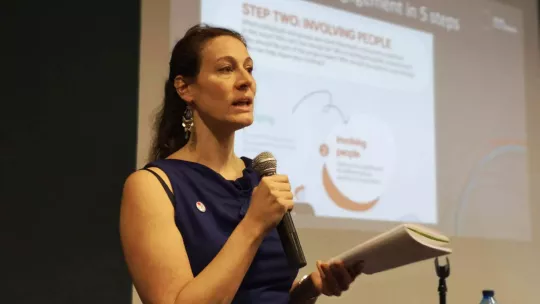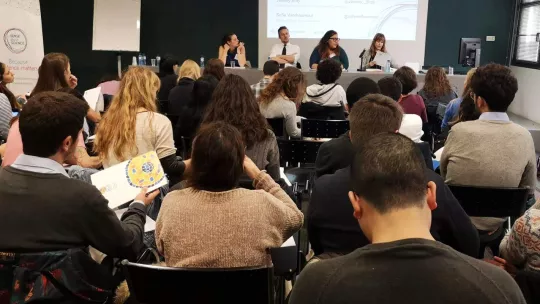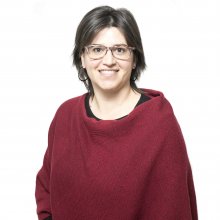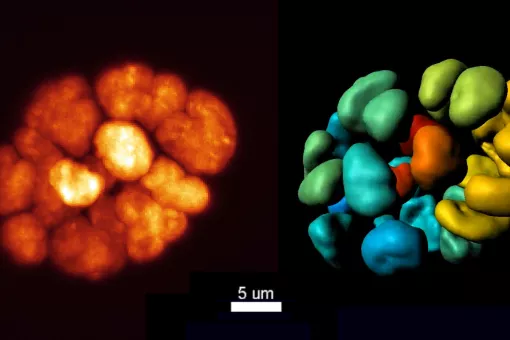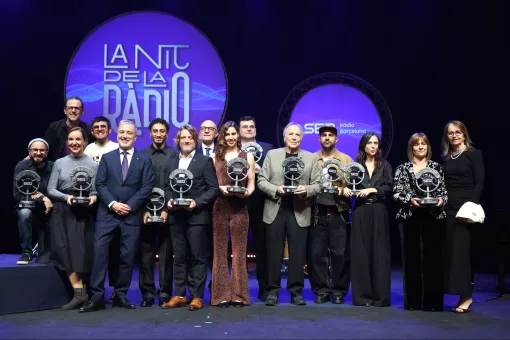Images
IRB Barcelona hosts the workshop “Standing up for Science”, for young researchers interested in public outreach activities.
Organised by the European organisation Sense About Science, the workshop involved more than 50 researchers, including members of IRB Barcelona, from various countries.
This month saw the Institute for Research in Biomedicine (IRB Barcelona) hosting the workshop “Standing up for Science”, run by European Union. This activity seeks to train and motivate scientists to get involved in public debates about science and to promote public participation in the communication of their results, adapting the language used to the audience.
“We participate in this kind of activity because it is important to provide our researchers with complementary skills so that they can connect with distinct audiences: political decision-makers, the media and the general public,” explains Muriel Arimon, IRB Barcelona’s Scientific Education and Public Engagement Officer, who was involved in organising the event.
Run by the organisations Sense About Science, Marie Curie Alumni and Voice of Young Science, the workshop was attended by more than 50 researchers from various countries. In the training session, they learnt why good evidence is important for political decision-makers, how the media work, and what journalists expect from scientists when communicating their work.
A number of IRB Barcelona researchers participated in this workshop. Hanna Kranas, PhD student in the Biomedical Genomics lab, found that the most important thing was that the speakers challenged current beliefs held by the audience regarding the relation with journalists, political decision-makers, and scientists. “I now understand the relevance of getting involved in UE politics and of disseminating my science in society. We have learnt that, as scientists, we can participate actively and facilitate communication so that it reaches a range of target audiences,” says Kranas.
The voice of science
Sofie Vanthournout, director of Sense About Science, explains that her organisation was set up because they perceived a need for reliable information for public debate, as information until then was either unavailable, unreliable or incorrect. “For example, there were media that were saying that mobile phones “fried brains”; the anti-vaccines movement arose; out-dated information was used when talking about transgenic crops, etc.”.
For Sense About Science, scientific evidence can be a powerful tool through which to change perceptions, to promote responsibility, and to favour change. “Researchers must realise that they have to inform about their work and in a way that is understood by diverse audiences (…) Also, they have to know how to listen first and talk later, above all when it is a subject that the public gives importance to, what we call ‘Public led, experts fed,’” says Vanthournout when referring to the responsibility held by researchers.
Communicating results
Whenever there is something missing in the discussion, the public will start to look for information. “If researchers are not prepared to give it, others will,” warns Vanthournout. The workshop addresses this point by fostering scientists’ interest in participating in public debates and encouraging them to work with the media and political decision-makers so that the voice of science reaches society.
About IRB Barcelona
The Institute for Research in Biomedicine (IRB Barcelona) pursues a society free of disease. To this end, it conducts multidisciplinary research of excellence to cure cancer and other diseases linked to ageing. It establishes technology transfer agreements with the pharmaceutical industry and major hospitals to bring research results closer to society, and organises a range of science outreach activities to engage the public in an open dialogue. IRB Barcelona is an international centre that hosts 400 researchers and more than 30 nationalities. Recognised as a Severo Ochoa Centre of Excellence since 2011, IRB Barcelona is a CERCA centre and member of the Barcelona Institute of Science and Technology (BIST).

